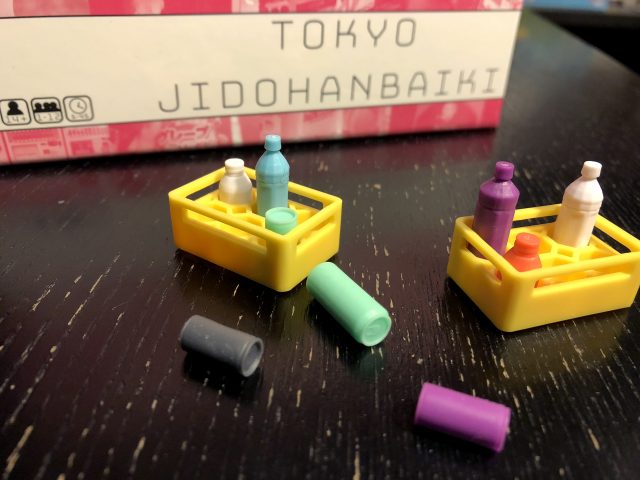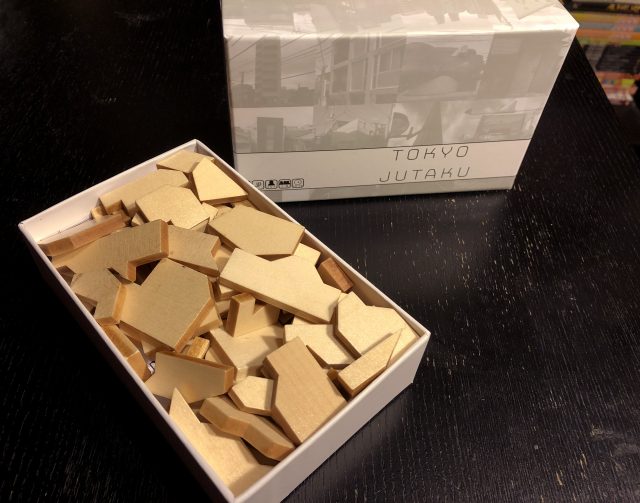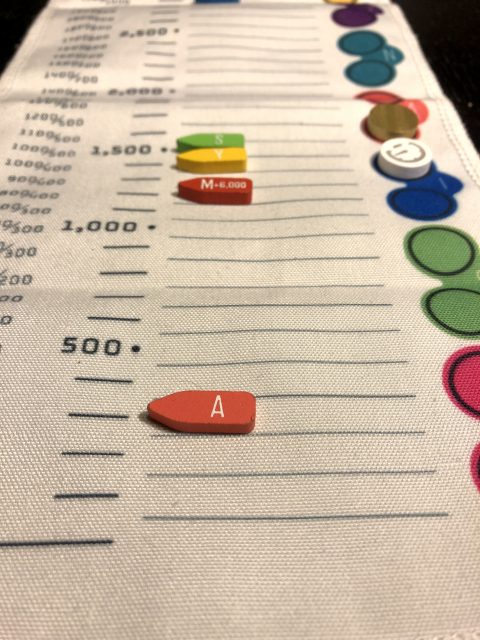Jordan Draper is not a name I’d heard before I saw his Kickstarter campaign for a series of games themed around life in Tokyo. Turns out he’s quite new to the design game; his first published game, Turin Market, was released only two years ago.
I forget the specifics of how the TOKYO series (why all in caps I don’t know, but that’s the way he liked it) came across my transom–it may have been in BGG’s hot forums, my FB page, I honestly don’t remember.
There were three games on offer:

When I saw what he was promising to deliver, I thought it was worth gambling on. I took the plunge and backed the full set. As far as KS campaigns go, it was one of the smoother ones I’ve backed–not quite as trouble-free as Tiny Perfect Gamelyn Games, but almost. When the games arrived a couple of weeks ago, I was astonished at how small the box was. Had there been a mistake in shipment, I fretted?
Nope. Turns out I’d missed the part where he said the boards for Metro would be printed on cloth, which meant everything could be packed into an astonishingly-small box–about the size of a Tiny Perfect box, in fact. The other two games had components which were a wee bit smaller than I expected, but everything was there, and they too fit comfortably into two even smaller boxes.
I’ve barely dipped into Jidohanbaiki, which comes with nineteen games you can play with its bits. What I can tell you is that Draper ensured that there is a wide assortment of games you can play with the bits: bluffing, bidding, matching, economic, multiplayer, solitaire, and so on. I can also tell you that because the bits are small you’d better have great fine motor skills because the cans and bottles can easily escape your grasp. Plus, the difference between the different sizes and shapes of bottle is not readily apparent because they’re all so darned small. Now, they’ve included some stickers you can wrap around the bits that will mitigate this problem, as well as make them look even more soda-fied, but I haven’t done this yet because to spoil either the purity of the colours or the possible resale value of the game. Oh, the agonies of the game collector.
What I’m most looking forward to is using the Jidohanbaiki bits as an extra layer in the other main games, because to me that’s where the real meat of the package lies.

Jutaku is an excellent visual-spatial real-time puzzle-race game—sort of Galaxy Truckeresque except you’re only building, not destroying, and it’s much shorter and more straightforward. There’s a grid of cards with irregular shapes on them representing building lots. You and and your competitors move your pieces around the grid attempting to build buildings whose footprint fits within the confines of the shapes (you don’t have to fill the whole thing) as well as having the specified number of floors and using the number of tiles specified on that card. Succeed, and you gain the card and its corresponding reward. Whoever ends up with the biggest total wins. Simple, easy to explain, loads of fun, an the laser-cut wooden pieces are a joy to handle.
But the game I want to focus on is the one which attracted my attention in the first place and which has exercised an unusual (for me) fascination since receiving it–to wit, I want to keep playing it over and over again.
TOKYO Metro (Metro hereinafter) plays out on a map of the labyrinthine Tokyo subway system. Players are trying to amass the most yen over six rounds by investing in rapid transit capital, both stations and the lines themselves. (I have no idea how realistic this is.) Buying stations is the only real source of revenue during the game, as well as being a way to boost the value of the line(s) which run through that station. But the long-term strategy is the usual “buy-low”, “sell-high” of stock games. You want to invest and/or speculate early in the lines you think will have the highest traffic, because those will bring the highest returns.
Turn order is bid on blindly at the beginning of every round, and going early is always an advantage–but the price you’re willing to pay for that privilege needs to be balanced by needing money to take actions later in the round. Nothing really new there.
No, the meat of the game is the action selection phase. There are twelve (!) possible actions available to choose from, but your choice is not unlimited; instead, there are six action card decks (each devoted to two of the actions) which unfurl cards as the game goes on. To take an action, you must use up one or more of your action discs. You start with three, but can obtain more by–you guessed it–taking a Disc action to get more up to a maximum of seven. This is why you want to be high in turn order; otherwise, you may be shut out of the action you want/need to take.
Most of the actions are pretty predictable for a game like this: buy a station; invest in a train line; take a loan; and so on. But it’s the others that help give Metro its unique flavour. One is to Start up a train on its line, which helps generate revenue for station owners without the burden of stock ownership. Another is the Speed action, which awards you one or more tokens which you can later place to permanently accelerate a particular train–which ultimately increases the number of payouts it makes.
The Speculate action is one I’ve never seen in a stock game. You can only Speculate in a line you haven’t invested in (and vice versa), boosting the value of that stock by at least a third of its current value (using your own money, natch) in order to get first call of that stock’s payout at the end of the game (before actual shareholders). Speculation can be done very cheaply in the early game, but its payoff is similarly limited. Or you can wait until later, but then it gets that much more expensive.

Another card which introduces interesting wrinkles is the Card action, which lets you take the top card of one of the action discard piles for your very own for the rest of the game. Timed correctly and early enough this can give you a monopoly over a powerful action which can make a huge difference.
Metro is a deep game with great components, including the cloth boards which make the game very portable but require taping down to keep the pieces from sliding around on the folds. The rules definitely require handling with care, including checking out the FAQ on BGG. One rule which was badly written and therefore interpreted incorrectly (the Start action–beware!) made money much less tight in the game; the second time around was much more intense (therefore better) but boo on Draper for not doing a better job there. The aesthetics of the action cards are beautiful but make it too hard to tell them apart, not helped by a Player Aid card that looks gorgeous but can induce epilepsy.
And yet despite those criticisms I repeat that I cannot get the game out of my mind and want to play it again and again–perhaps my first real BGG “10” in a long long time. Between players who know the board well and therefore the advantages and disadvantages in investing in certain stations and lines, I can imagine a delicious metagame arising. The concept also begs for expansions based on other subway systems: New York; London; Moscow…sadly, Toronto’s would not make for a very interesting one, unless you expanded the idea to include bus or streetcar lines, which is easily-enough done.
I haven’t even dipped into the variant where you add the soda cans from Jidohanbaiki to add another layer of strategy whereupon you might give up one of your action discs for the right to sell drinks of a certain colour at stations, which provides another source of income as trains them. I want to get some more plays of the vanilla version under my belt before trying it out, but I definitely want to!
Draper has now announced an imminent Kickstarter campaign for a second series of TOKYO games, and I for one will be hard-pressed not to back it based on the quality of the first three games of the series. Even if Metro doesn’t sound like your cup of cha, you might want to get Jidohanbaiki for its versatility or Jutaku for its puzzly party fun. You will not regret it!
Comments
No comments yet! Be the first!